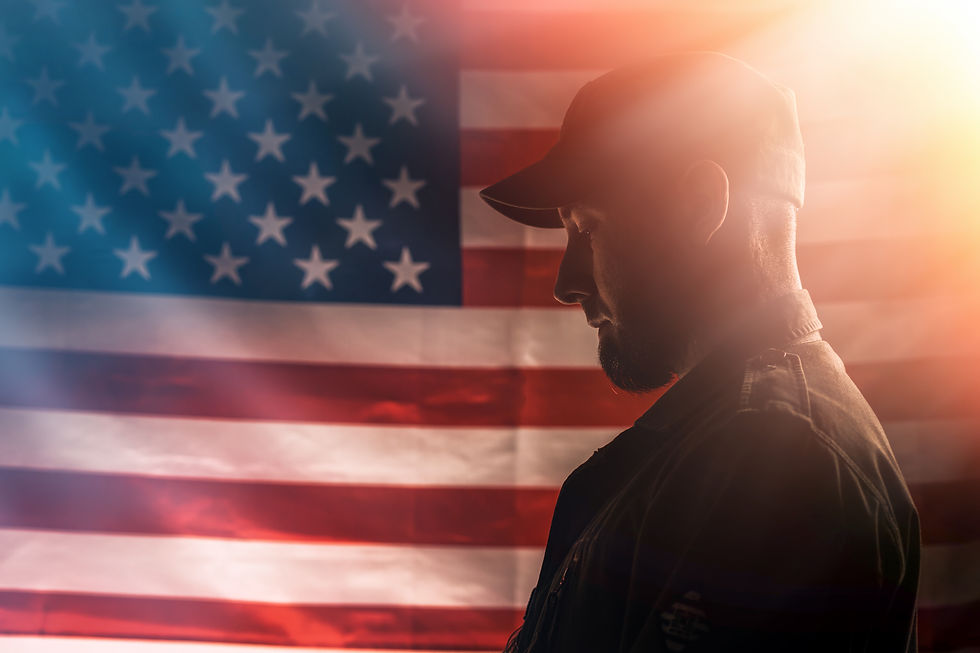To Stand with a Warrior
- Naomi

- Nov 1, 2021
- 3 min read
Updated: Apr 5, 2022
“To stand” with someone is means to unite with them. Likewise, it means to fight as one in favor of or in opposition to something. To stand means to be a voice alongside someone else. What, then, does it mean when we call you to “Stand with a Warrior?”

Why We Need to Stand With Them
In 2011, the Mental Health Advisory Team collected from active-duty deployed soldiers and marines across varying ranks [1]. They found that E1 to E4 soldiers who screened positive for requiring mental health services did not seek help because:
28.6% believed “it would be too embarrassing.”
48.9% feared they would be “seen as weak.”
29.2% believed “it would harm my career.”
33.9% believed “my leaders would blame me for the problem.”
41.8% thought “members of my unit might have less confidence in me.”
And 46% felt that “my unit leadership might treat me differently.”
There are many barriers and personal reasons as to why Veterans do not seek help. When they do not receive the support they need to cope with their post-traumatic stress, it can affect every aspect of their lives, and their quality of life declines. Sometimes, being as extreme as resulting in loss of life. Over the past couple of years, the Department of Defense has actively been working to implement regulations and programs to decrease the stigma internally of seeking help. However, how can we, as the general public, externally reduce the stigma? Additionally, how can our veterans that have retired and have received help encourage their fellow brothers and sisters in arms to get the help they need also?
What It Means to Stand with a Warrior
That’s where our call to Stand with a Warrior comes in. Standing with a Warrior means to stand against the stigma of seeking help. Externally, when we stand for our veteran’s mental health, we act as the voice of encouragement. We are actively voicing out to our veteran population that it is okay to not feel okay. It is okay to ask for help when you have reached the end of your rope. Standing with a Warrior means standing for the brave soldiers that brought the war home with them.
How We Can Stand With Them
The National Alliance on Mental Illness provides ways to fight mental health stigma-- which can also be applied to stand with the warrior. As we embark on our Stand with a Warrior campaign, we encourage you to put these into practice:
Talk Openly About Mental Health and Well-Being Amongst the Military Community
You fight the stigma and stand by openly talking about the challenges that veterans and military spouses face. Encourage asking for help as being a sign of strength, not weakness-- because it is.
2. Educate Yourself and Others
Take every opportunity to learn about post-traumatic stress and holistic practices. If you’re a veteran or military spouse, share your personal story and your struggles. We sometimes gain courage by relating to the story of others that have sought out healing.
Will you stand?
There is an incredible amount of support and programs available to veterans and their families impacted by post-traumatic stress. With The Warrior Connection being one of them, we ask you now to stand with us in support of healthy well-being in our veterans and their families. When you stand with TWC, you are providing an avenue to healing in areas that medication and therapy may not be able to heal-- the heart and mind connection. This is our call to you to talk openly about standing. To educate yourself and others about the need to stand. Start a fundraising campaign or donate during our Stand with a Warrior Campaign. Will you stand with a warrior?
References
[1] Office of the Surgeon General, U.S. Army Medical Command, Joint Mental Health Advisory Team 7 (J-MHAT 7) Operation Enduring Freedom 2010 Afghanistan, Fort Sam Houston, Texas, February 22, 2011. As of January 31, 2014: http://www.dtic.mil/cgi-bin/GetTRDoc?AD=ADA543997





Comments